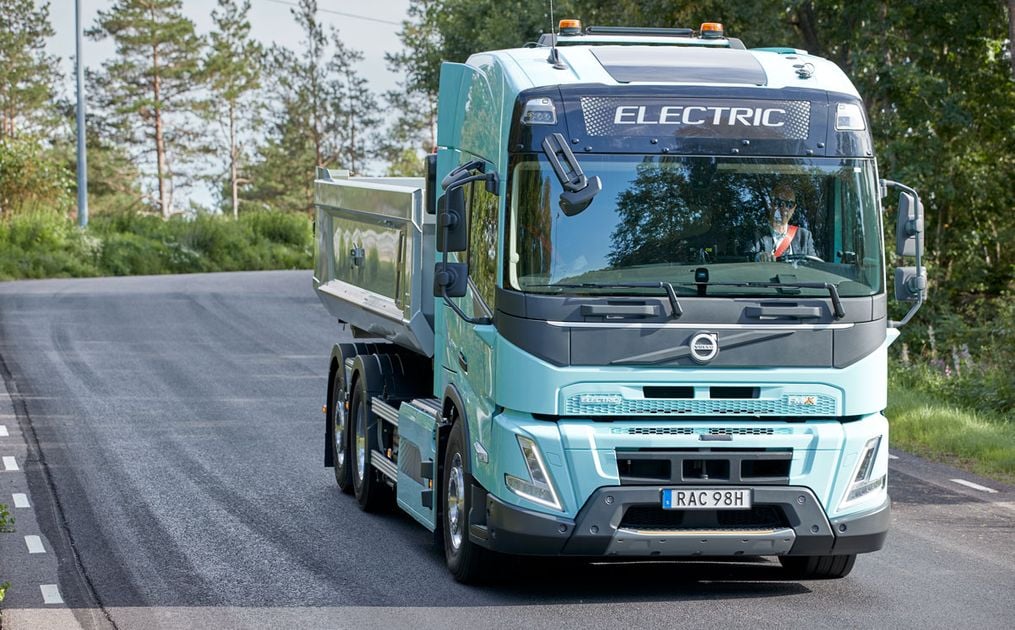
New EU CO2 rules broaden the scope to include vocational trucks.
Photo: Volvo Group
The European Parliament approved a mandatory target to reduce 90% of CO2 emissions from new heavy trucks by 2040. The regulation sets tougher standards than previous EU legislation and widens the scope of vehicles covered.
- CO2 emissions from large trucks (including vocational vehicles, such as garbage trucks, tippers or concrete mixers) and buses will have to be reduced by 45% for the period 2030-2034, 65% for 2035-2039 and 90% as of 2040.
- By 2030, new urban buses will need to reduce their emissions by 90% and become zero-emission vehicles by 2035.
- Emissions reduction targets are also set for trailers (7.5%) and semi-trailers (10%), starting in 2030.
The regulatory scope has been significantly expanded to include more truck types, buses, coaches, trailers, and vocational vehicles such as garbage trucks. Under this new scope, over 90% of all new truck and bus sales are covered by the revised CO2 standards, up from 65% under the original standards.
The law requires the European Commission to conduct a detailed review of the effectiveness and impact of the new rules by 2027. This review will need to assess topics such as:
- Whether to apply the rules to small lorries.
- The role of a methodology for registering HDVs exclusively running on CO2-neutral fuels.
- The role that a carbon correction factor could have in the transition toward zero-emission heavy-duty vehicles.
European Trucking Industry to Experience ‘Transformative Shift’
“What seemed inconceivable just years ago is now the unequivocal path forward,” said Felipe Rodríguez, director of the Heavy-duty Vehicle Program at the International Council of Clean Transportation, a research organization advising governments on transport decarbonization.
“This historic legislation offers clarity to industry, leveraging zero-emission heavy vehicles as the most technologically feasible and cost-effective route to meet Europe’s climate goals,” Rodriguez said in a statement, saying that the trucking industry “is about to experience a transformative shift.”
According to ICCT, manufacturers must progressively introduce cleaner vehicles into the market to avert fines. On average, new trucks need to emit 43% less CO2 in 2030 than they did in 2019, 64% less in 2035, and 90% less in 2040.
City buses will witness an even swifter transition, with 90% of sales required to be zero-emission by 2030 and a complete phase-out of fossil-fueled bus sales by 2035.
Although the council still needs to formally approve the agreement, the European Parliament said the deal had been already agreed upon with the Council before the Parliament vote.
Truck and Bus Makers: ‘Vital Enabling Conditions’ Needed to Meet Ambitious CO2 Goals
13 CEOs of leading European vehicle manufacturers and suppliers met with the EU Commissioner for Climate Action, Wopke Hoekstra, for roundtable to discuss the green transition, according to ACEA, the association representing auto and truck makers in Europe.
During the roundtable, both European truck and bus manufacturers said they are committed to providing the right vehicles to move the road transport industry into fossil-free solutions by 2040, focused on battery-electric and hydrogen-powered vehicles.
Achieving the CO2 reduction targets remains highly ambitious in the near absence of vital enabling conditions, such as a dense network of truck-suitable charging and refuelling stations and a supportive carbon pricing framework to ensure cost parity for zero-emission vehicles, according to ACEA. European vehicle makers called on Europe’s policy makers to take ambitious action to address these concerns.
In addition, the truck and bus makers said, the internal combustion engine will continue to play a long-term role in heavy-duty transport, and that climate-neutral solutions and other complementary technologies will be needed to meet climate targets.
The European Automobile Manufacturers’ Association (ACEA) represents the 15 major Europe-based car, van, truck and bus makers: BMW Group, DAF Trucks, Daimler Truck, Ferrari, Ford of Europe, Honda Motor Europe, Hyundai Motor Europe, Iveco Group, JLR, Mercedes-Benz, Nissan, Renault Group, Toyota Motor Europe, Volkswagen Group, and Volvo Group.


